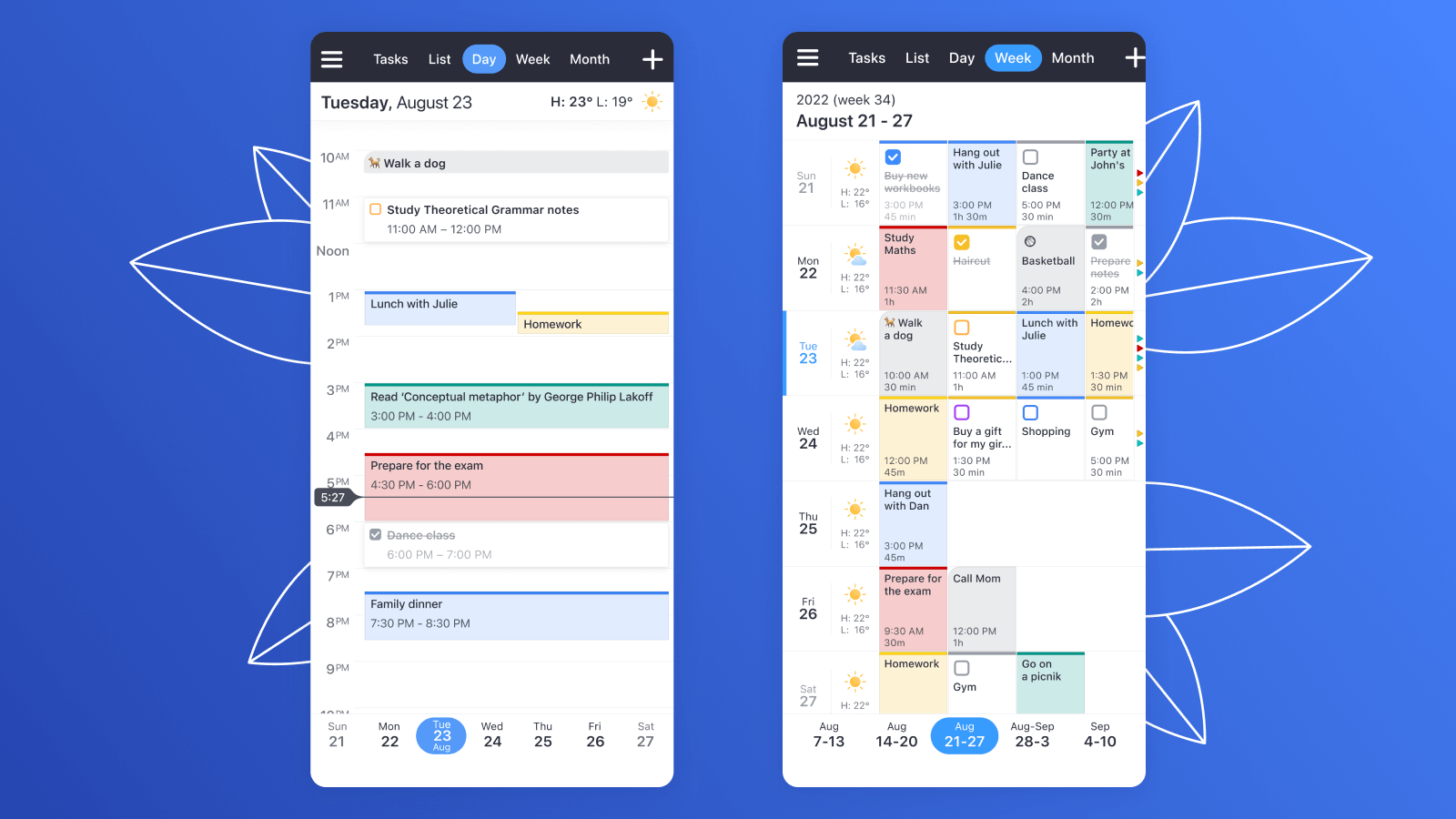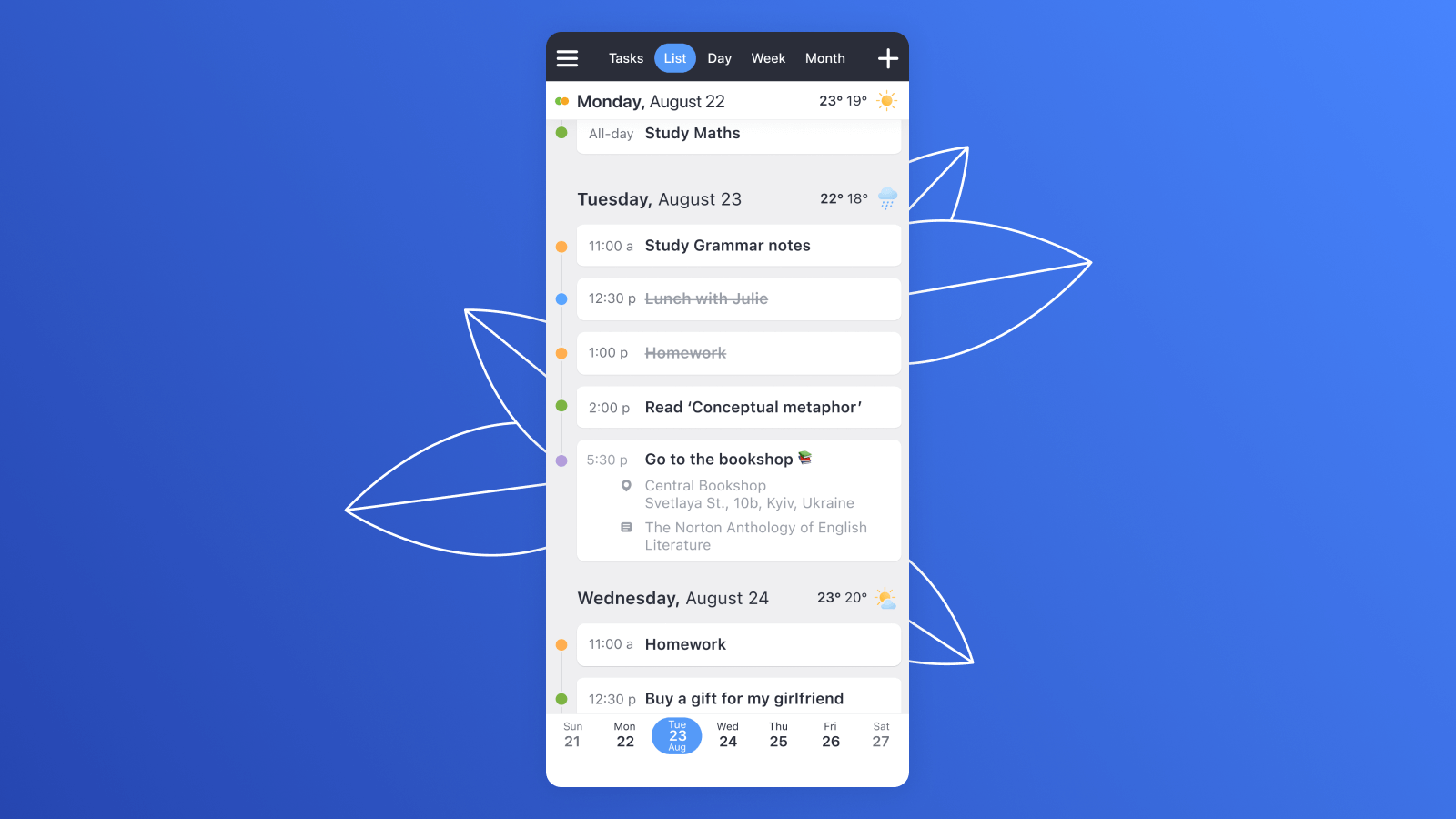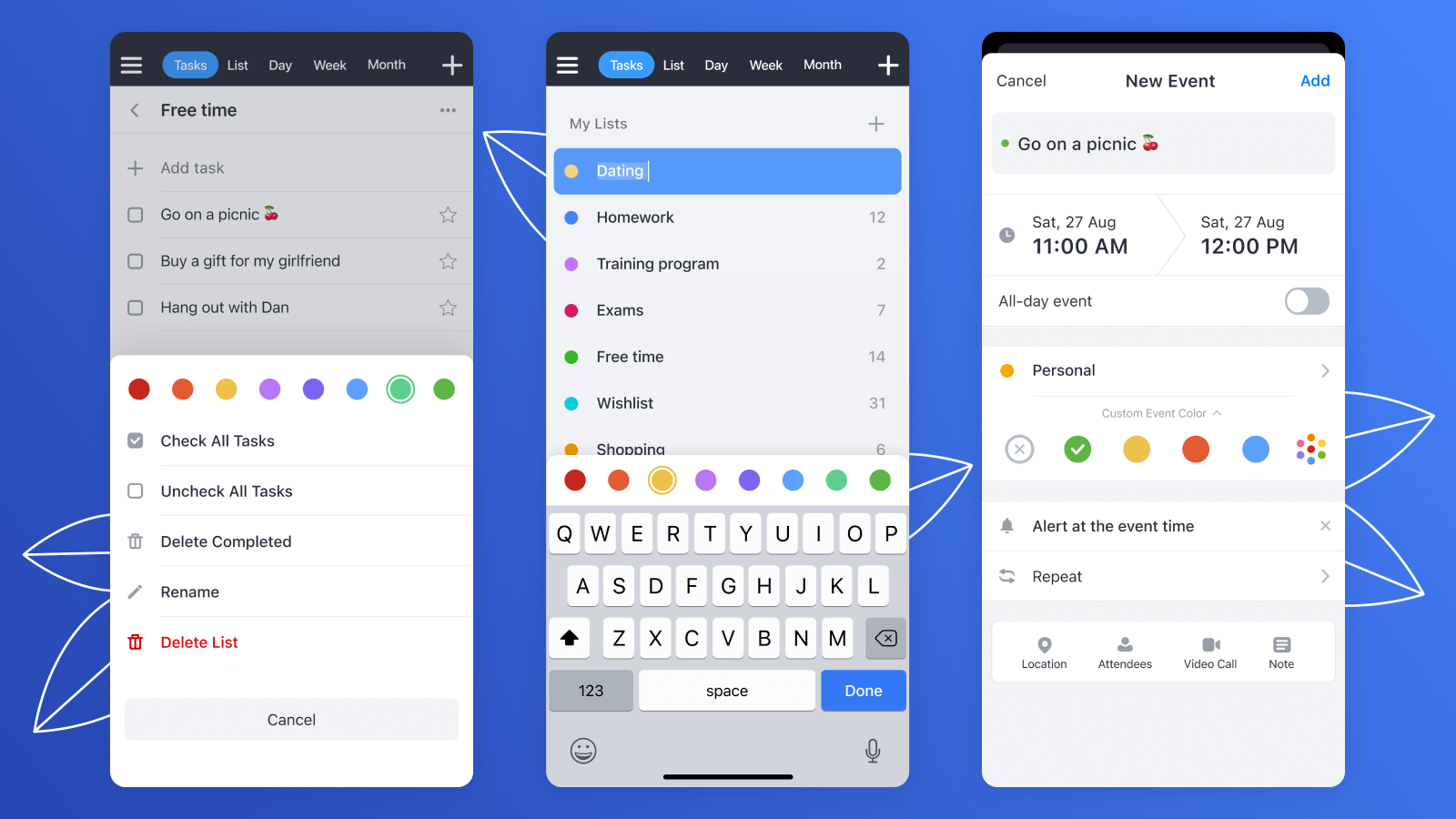“A little party never killed nobody. They only kill coursework deadlines.” – it's a thought many students have while taking their morning shower the day after a big night out. Showering in the morning before class can give you a solid block of “me” time. Time that can be used to plan the day ahead. There’s something about popping into the library, grabbing a cup of coffee with a friend, studying plans and drinking eight glasses of water a day. You calculate your schedule with pin-point accuracy, considering even such a thing as the human factor. Time is what we have because time is what we are.
A professor of engineering at Oakland University, Barbara Oakley, in her lectures “Learning how to learn” compares a weightlifting competition to a process of learning: “To gain muscular structure, you need to do a little work every day, gradually allowing your muscles to grow,” she says, “Similarly, to build neural structure, you need to do a little work every day, gradually allowing yourself to grow a neuro-scaffold to hang your thinking on a little bit, every day, and that's the trick.”
So, learning something new takes time, yes, that’s true.
But how not to miss neither parties nor assignment deadlines?
You need to prioritize first. And then plan accordingly. Learning is very important. Your whole career depends on it. Yet, partying isn’t all bad! It can help you open up, develop your social skills, and meet new people who can become great connections later in life.
Again, it’s all about balance. To do this, make a schedule and don't do anything else until you have finished your studies and have met the expectations you set for yourself. As for parties, decide which ones are appropriate and can be useful. A faculty party can be a great chance to meet people you would not otherwise contact. And learn to say "no, thank you" to everyone else unless you are 100% sure you are doing well in your studies.
Plan your time and use it wisely.
And the tool for balancing is your calendar
“How we spend our days is, of course, how we spend our lives,” Annie Dillard. Having an up-to-date calendar can do wonders in structuring, de-stressing, and keeping your week on track. Calendars can do more than just remind you when to visit the dentist or submit your home assignment. There are several ways you can manage your time. One of the tried-and-true methods is to get your calendar organized.
Organize tasks to balance the two different learning modes

Barbara Oakley mentions that researchers have found that we have two fundamentally different modes of thinking: the Focused and the Diffuse modes.
We're familiar with focusing. It's when you concentrate intently on something, trying to learn or understand the subject. But we're unfamiliar with diffuse thinking, which is a more relaxed thinking style related to neural resting states.
Barbara says that the diffuse mode could be considered a torch set so that it broadly casts its light but is not very strong in any area. (As opposed to the focused mode, which would have its light cast very strongly in a single area, but very weakly everywhere else.)
That’s what Tasks do: they help you obtain knowledge and complete assignments on time or other important work without feeling pressure. Thus, Calendars help you reduce your frustration and master chunking skills.
Visualize deadlines

Sometimes, we get distracted, but when deadlines come first, it's harder to get sidetracked. By creating a timeline with visual aspects for you to see everything, you will constantly be reminded of upcoming dates. You'll never guess if your homework is due on Thursday or Friday, you won't guess if it's at 6 am or 6 pm. By the way, set a reminder before the deadline. It's not for nothing that beauty salons call the day before a visit to confirm the visit, is it?
If it's an important exam, try setting a reminder a few days in advance so you can sleep in the night before the big day, rather than having a 3-cup drink while rereading an outline.
In the List section, you can see all your tasks, events and their duration. So, if writing a plan for a research paper requires 1 hour, indicate this time and keep on writing this plan for an hour. Having the list in front of your eyes is the same as for the intelligence seeing the detailed high-quality photos of the areas: everything in full view, and all in the palm of your hand.

Add smaller goals to your calendar
Dividing large projects, such as a research paper, into smaller parts, such as finding sources, writing an outline, and creating citations, will make your work easier. You will be better able to estimate how much time a more minor task will take than a larger one, such as writing an entire research paper on a weekend. If you are facing a marathon study session, plan your projects well ahead of deadlines. By making a deadline for yourself well in advance, you can avoid a last-minute mess of work.
It can also help to schedule time for more general tasks, such as setting aside 15 minutes to respond to unread messenger messages from friends or making a schedule to clean your room in the morning or evening.
Form your routine
That will be a joy to eyes to see a beautifully-looking plan. Calendars are stylish! And without too much modesty, we declare we have achieved great design. To run your day, week, or month single-handedly, try to build a regimented routine for yourself to manage the repetitive tasks. Sometimes the volume of what you need to get done in a week is so enormous, you have to be disciplined and a well-designed routine to your day could help center and move you along.
The ability to colour-code events and task lists, along with the drag-and-drop feature, makes the planning process more entertaining rather than boring. And yes, there is an option to use an emoji.

We wanna know — if you could only use one emoji for the rest of your life, which would it be and why? Let us know here.
By the way, are you as excited about crossing tasks off your list? Calendars has a special place for crossed-out tasks — the Completed column. The feeling of resolving even one thing out of to-dos gives satisfaction, doesn’t it?
Use "Notes" and the "Add location" section, linked to Google Maps or Apple Maps. You can use this feature to provide additional parking information, important contact information such as the phone number of your dentist or coursework supervisor, a list of things to take with you, or a treat for your dog to buy.

Back in the past
Having a calendar can help you even with self-reflection. At the end of each week or month, look at your calendar. When have you been on time, and when have you canceled or rescheduled classes? Pay attention to the days when you did not finish the task in time. Perhaps you should allow more time to complete the task? We mentioned a plan. If you have failed in an hour, maybe you should give yourself more time. Or did you rush after writing your work to a meeting? In that case, next time, try sitting down to write early in the morning. Suddenly your productivity will be much higher, knowing that you don't have to rush.
Or, if you tend to cancel activities on Fridays after a long week, try studying on Saturdays. Coffee shops are empty in the mornings, and you have a good view of a park or half-empty streets with only doggie owners walking around. I tested on my own 😉
Have a rest!
The modern obsession around productivity has blinded us; or has planted the seeds of laziness and frustration. Thus, the race for being super productive leads to passivity, where the mind only offers to move that deadline again and again. Well, stop… That’s not so bad.
“Busy is a decision… You don’t find the time to do things — you make the time to do things”, says Jonathan Fields in her “Uncertainty: Turning Fear and Doubt into Fuel for Brilliance.”
Yes, you have a lot to do! Yet, there’s no need to work and study to the point it becomes a badge of honor. Having a rest, recharging batteries, or relaxation by any other name is important to avoid burnout. Although you may not be able to devote much time to it each week, setting aside planned free time during the week so you can recuperate — whether it's an evening with Netflix, relaxing with family, or partying with friends is the ultimate productivity hack.
What do quorans say?
Jim Grupé: “Smart ones know their priorities: studying and getting good grades will pay off with a lifetime of success. Parties and Fun are very short-term.”
Karen Detweiler: “Partying and having fun can also fit into the schedule. Good students will limit the number of nights they're out partying to one or two per week. Some schools have a "soft Friday" so some students have a weekend from Thursday night until whenever they wake up Sunday.”
There’s also a thread on Reddit where the unknown deleted user shares a formula of healthy balancing. It recommends to sleep more than you study, study more than you party, and party as much as possible.
To follow this formula, you can use Reminders notifying you to let go of the book and take a lunch break, send flowers to your granny, or pick up the parcel with that stunning T-shirt from FarFetch for your Friday birthday party.
Think of it
This post is meant to change the way you view your productivity and time management, so the quality of your work/life balance will be better. How you choose to spend your time isn’t just logical; it’s also emotional. Feeling skeptical?
Try Calendars and see where you are and how you feel. You may be surprised!


 Vita Vypovska
Vita Vypovska 

